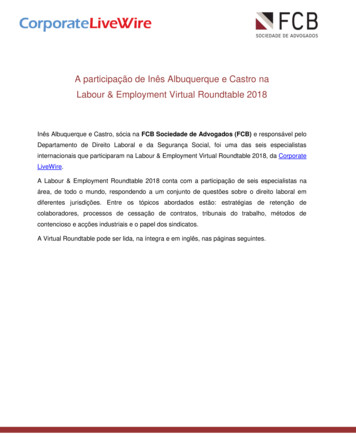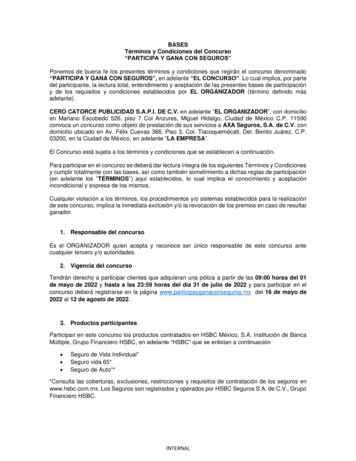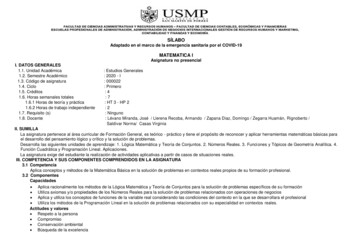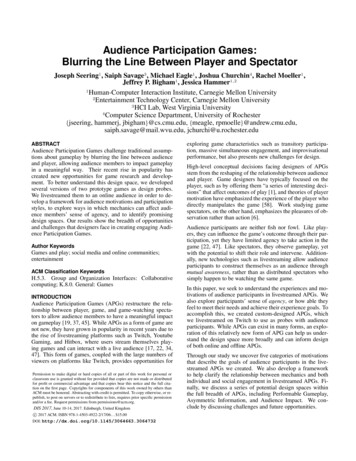
Transcription
A participação de Inês Albuquerque e Castro naLabour & Employment Virtual Roundtable 2018Inês Albuquerque e Castro, sócia na FCB Sociedade de Advogados (FCB) e responsável peloDepartamento de Direito Laboral e da Segurança Social, foi uma das seis especialistasinternacionais que participaram na Labour & Employment Virtual Roundtable 2018, da CorporateLiveWire.A Labour & Employment Roundtable 2018 conta com a participação de seis especialistas naárea, de todo o mundo, respondendo a um conjunto de questões sobre o direito laboral emdiferentes jurisdições. Entre os tópicos abordados estão: estratégias de retenção decolaboradores, processos de cessação de contratos, tribunais do trabalho, métodos decontencioso e acções industriais e o papel dos sindicatos.A Virtual Roundtable pode ser lida, na íntegra e em inglês, nas páginas seguintes.
Labour & Employment Law 2018Virtual round tablewww.corporatelivewire.com
Round Table: labouR & employmenT law 2018Introduction & ContentsLabour & Employment Roundtable 2018 features sixexperts from around the world. Highlighted topicsinclude: employee retention strategies, terminationprocess, employment tribunals, dispute resolution61. Have there been any recentregulatory changes or interestingdevelopments?methods and industrial action and the role of thetrade unions. Featured countries are: Australia,Canada, Mexico, Portugal and the United States.Editor In ChiefHow do employment tribunals19 operate in your jurisdiction?8. Which dispute resolution method21 do you find are most commonlyrecommend to employers and why?102. Can you outline the current labourmarket conditions in your jurisdiction?123. How can employers/employees better 23understand their rights?9. What legal issues do employersoften overlook during a terminationprocess?144. Are there any effective employeeretention strategies or best practicesfor manager-employee relations anorganisation can implement?10. What is the law for workerscompensation in your jurisdiction andwhat does it cover?165. What are the employment rightsfor those considering taking part inindustrial action or strikes?186. In the UK, the public perception oftrade unions is that their power hasbeen slowly diminished since thepremiership of Margaret Thatcher.What is the current role for trade unionsin your jurisdiction both in regardsto conflict resolution and workplacerelations?James Drakeford2611. What key trends do you expect27 to see over the coming year and inan ideal world what would you like tosee implemented or changed?7.2January 2018January 20183
Round Table: labouR & employmenT law 2018Meet the expertsPaula Barran - Barran Liebman LLPT: 1 503-276-2115E: tray@barran.comW: www.barran.comPaula Barran, a founding Partner at Barran Liebman LLP, has been practicing labor and employmentlaw since 1980. She has written extensively on management law and is a national speaker and trainer.In addition to providing employer advice, Paula handles employment litigation in state and federalcourts, and labor disputes and employment arbitrations. Additionally, she develops and presents“train the trainer” programs to introduce comprehensive, and cost effective, training programs intoworkplaces. Since the first publication of the Oregon Super Lawyers Magazine in 2006, Paula has repeatedly been namedas a “Top Ten Lawyer” in Oregon. In 2008, 2010, and 2017, she was honored as the “Top Point Getter” for the year andwas honored as the #2 Top Point Getter in 2016. Since 2003, Paula has been ranked #1 (with partners Ed Harnden andRick Liebman) for Labor and Employment Law defense in the State of Oregon by Chambers & Partners USA, America’sLeading Business Lawyers. She is also a fellow of The College of Labor and Employment Lawyers, a fellow of the AmericanBar Foundation, and has been named in The Best Lawyers in America directory since 1995. She is admitted to practice inOregon, Washington and before the U.S. Supreme Court, U.S. Court of Appeals, Ninth Circuit, U.S. District Court, Districtof Oregon and U.S. District Court, Eastern and Western Districts of Washington.Inês Albuquerque e Castro – FCB Sociedade de AdvogadosT: 351 213 587 500E: ic@fcblegal.comW: www.fcblegal.comInês Albuquerque e Castro is a Partner at FCB since 2017, having joined the firm in 2015 as anAssociate Lawyer. Inês currently coordinates FCB’s Employment, Benefits and Pensions Departmentand has a degree in Law from the Faculdade de Direito da Universidade de Lisboa.Inês frequently contributes to various legal publications, having written numerous articles on thesubject of Labour Law in the context of several jurisdictions, namely Portugal, Angola and Mozambique. She is a regularspeaker at conferences, seminars and workshops and has been recognized many times by legal guides.Francois Garneau - Miller ThompsonT: 1 514 871 5415E: fgarneau@millerthomson.comW: www.millerthomson.comFrançois Garneau practises employment and labour law. His clientele consists of employers fromvarious sectors including pharmaceutical, oil, mining, computer consulting, food products, andmanufacturing. François has also acted for Crown corporations including Canada Post, LotoQuébec, Hydro-Québec, and the Société Générale de Financement. In addition, he representssenior executives in negotiations involving employment termination and provides counsel in thedrafting of employment contracts.4January 2018Natalie C. MacDonald - MacDonald & AssociatesT: 1 416-601-2300E: nmacdonald@macdonaldassociates.comW: www.macdonaldassociates.comNatalie is the Owner and Founder of MacDonald & Associates, a boutique law firm specializingin Canadian Employment Law. MacDonald & Associates was formed following the dissolution ofNatalie’s former firm, which had been in existence for four years, the last two for which it had beenselected as one of the top three Employment & Labour Law firms in Canada, according to CanadianHR Reporter Readers’ Choice Awards.Natalie was selected in 2016 and 2017 as one of the leading Labour and Employment Law Practitioners in the World,according to the 6th and 7th editions of the Expert Guides Women in Business Law Guide. Lawyers listed in these Guidesare nominated by in-house counsel and peers, and selected through independent research and peer evaluations.David Eugenio Puente-Tostado - Sanchez DeVanny Eseverri, S.C.T: 52 82 8153 3913E: dpt@sanchezdevanny.comW: www.sanchezdevanny.comDavid co-heads the Labor, Social Security, and Immigration practice. He has more than sixteenyears of experience advising domestic and foreign clients on labor, immigration and socialsecurity matters arising from investments, establishment, daily operations, and mergers or otherrestructurings. He also has extensive experience in collective negotiations and litigation. Beforejoining Sánchez Devanny, David practiced law at an international law firm in Monterrey. He speaksfluent English and Spanish.Joydeep Hor - People & Culture StrategiesT: 61 2 80943101E: joydeep.hor@peopleculture.com.auW: www.peopleculture.com.auJoydeep Hor is People Culture Strategies Founder and Managing Principal. He is one ofAustralia’s most well-known workplace relations lawyers due to his high media profile (both as asought-after media commentator and prolific keynote speaker including appearing regularly as aguest commentator on Sky Business Channel) and his representation of several high profile clientsthroughout his career.While an expert in all areas of workplace relations, Joydeep is one of Australia’s “go to” lawyers for complex and sensitiveterminations of employment and also for addressing all aspects of workplace behaviour and culture.With professional qualifications already as a Fellow of the Australian Human Resources Institute, Chartered Fellow of theUnited Kingdom’s Institute of Personnel and development, a Master of Laws from University of Sydney (where he previouslycompleted a Bachelor of Laws with Honours degree and a Bachelor of Arts majoring in English literature) Joydeep has beenaccepted into and is currently completing Harvard Business School’s Owner/President ProgramJanuary 20185
Round Table: labouR & employmenT law 20181. Have there been any recent regulatory changes or interesting developments?MacDonald: One of the most significant developmentsin Canadian Employment Law relates to the increase inextraordinary damages as awarded in the recent caseof Galea v. Wal-Mart Canada Corp. 2017 ONSC 2045,argued by the author. In that case, Mr. Justice Emery,awarded 250,000 in moral damages, a head of damages awarded for the employer’s bad faith conduct inits manner of dismissal, where it is reasonably foreseeable that this would cause the employee mental distress.The award in Galea is now the highest amount of moraldamages ever awarded in Canadian employment law.Mr. Justice Emery made this award after reviewingWal-Mart’s pre and post termination conduct, takinginto consideration several factors, including its litigation misconduct, (pace and process of documentarydisclosure); its misleading and dishonest conduct ingeneral, and the fact that Wal-Mart cut off her compensation in the midst of its restrictive covenant with her,despite not having any evidence that she competed.Of fundamental importance was that he also awardedthe damages, where no expert medical evidence hadbeen presented, but only the testimony of Ms. Galea.In that regard, he relied upon the Supreme Court ofCanada’s decision in Saadati v. Moorhead, 2017 SCC28 (CanLII) where the court found that expert medicaltestimony was not required in a personal injury case,which he applied in the employment law context. Thiswas significant, as there had been much debate aboutwhether medical evidence was required to award damages. Galea appears to have resolved that.Equally of significance, Mr. Justice Emery also awarded 500,000 in punitive damages against Wal-Mart, thehighest reported level of punitive damages awarded6January 2018in the employment law context based on the bad faithdisplayed by Wal-Mart. This was found separate to thedamages he had awarded for moral damages, as he concluded that the actions of Wal-Mart had surpassed theactions of another employer in Pate Estate v. GalwayCavendish and Harvey (Township) 2013 ONCA 669,where 450,000 was awarded to an employee who hadbeen accused by the employer of criminal conduct, yetwas found completely innocent.Tostado: Yes. There was a constitutional reform inregards to labour justice, which was published in theMexican Official Gazette on 24 February 2017. In summary, the reform contains the following outstandingpoints: The formation of labour courts or tribunals,now dependent of the Judicial Branch with respect to federal matters and dependent from thejudicial branches of the States with respect to local matters (the Federal Labour Law establisheswhich are federal and which are local matters).It also refers to the disappearance of the Conciliation and Arbitration Labour Boards, whichare the current authority that solves any disputebetween employees and employers, or betweenunions and employers. The Labour Boards weredependent of the Executive Branch.The creation of Conciliatory Centres to dealwith local matters; and the creation of the decentralised organism for federal matters, bothhaving conciliatory functions, and the decentralised organism having an additional functionof registering collective bargaining agreements,union organisations and all of the administrative acts derived thereto. With respect to collective matters, the unionswill now be obligated to evidence that they havethe representation of the employees to present anotice to intent to strike to obtain the signatureof a collective bargaining agreement. Likewise,for entitlement conflicts between unions, execution of a collective bargaining agreement andthe election of union leaders, the reform guarantees that the employees’ vote will be personal,secret and at free will.Regarding the solution of employee-employerconflicts, before going to the labour courts, amandatory conciliatory stage should take place,which will be handled by the conciliatory centres or the decentralised organism, in their corresponding venue.The reform contemplates that the Congress and the local legislatures will have a year, as of the date in whichthe reform comes into effect, to do the necessaryamendments to the corresponding legislation. There iscurrently one amendment to the Federal Labour Lawhowever we anticipate the amendments will containeight new procedures, in addition to legislating the Organic Laws of the Conciliatory Centres and Decentralized Organisms.Hor: In recent years, the national regulatory body, TheFair Work Ombudsman (“FWO”) has pursued employers in relation to a range of compliance issues, particularly the underpayment of wages and other minimumentitlements. The Fair Work Ombudsman takes around50 matters to court each year. Increasingly it is focusingnot only on the employing entity, but on other parties,such as directors and HR executives who are involved inthe alleged contravention, and hence personally liablefor any breach under accessorial liability laws. Prosecutions of this nature have recently extended to obtaining penalties against an accounting firm for knowinglyhelping one of its clients exploit a vulnerable worker.The FWO has also been focused on compliance byemployers where vulnerable workers are engaged. Reinforcing this approach, in September 2017, the FairWork Act 2009 (Cth) (“FW Act”) was amended to include a number of new measures aimed at protecting“vulnerable workers.” These measures include:January 20187
Round Table: labouR & employmenT law 2018 stronger powers for the FWO to collect evidence during investigations;new penalties for providing false or misleadinginformation to the FWO, or hindering or obstructing an FWO investigation;increased penalties for “serious contraventions”of workplace laws (e.g. deliberate contraventions);increased penalties for breaches of record-keeping and pay slip obligations; anda reverse onus of proof in underpayment claimswhere an employer has not met record keepingor pay slip obligations and cannot show a reasonable excuse.In July 2017, as part of its Four Yearly Review of Modern Awards, the Fair Work Commission (“FWC”) decided to incorporate a model “casual conversion” clauseinto 85 Modern Awards. The model clause allows forcasual employees who have worked a standard pattern of hours over the 12-month period to be eligibleto make a request to convert to full-time or part-timeemployment.Importantly, the amendment also requires employersto inform casual employees of their right to request thisconversion. The request to convert can only be refusedby an employer on reasonable business grounds (forexample, where the conversion would require a significant adjustment to the casual employee’s hours of workor where it is known or reasonably foreseeable that theemployee’s position will cease).Another interesting development in 2017 from thislegislative review was the decision to reduce penalty8January 2018rates in the retail and hospitality sectors. Sunday andpublic holiday penalties were cut with the Full Bench ofthe FWC agreeing with the Productivity Commission’sfindings that the reduction in penalty rates would have“some positive effects” on employment.Garneau: In 2017, Canadian legislators were particularly prolific compared to judges, and we expect changes in the employment standards of at least four provinces. After two years of independent review and despitethe polar opposite views of economists on the subject,the Ontario government enacted amendments to theEmployment Standards Act and Labour Relations Act,which include a rise of the minimum wage to 15 anhour by 2019. In Quebec, wages have been raised from 10.75 an hour to 11.25 an hour as of 1 May 2017,which is the highest annual increase since 2010. Finally, in Alberta, the New Democrat government draftedmuch needed amendments to the province’s workplacelegislation, last updated in 1988. These amendments areexpected to come into force in January 2018 and evenif quite modest, their objective is to achieve a more fairand family friendly workplace.On the heels of various highly publicised sexual scandals which have also occurred in Quebec, the government has introduced novel legislation to regulate and/or proscribe the nature of intimate relationships university and college teachers may have with students. Also,even though Quebec employment law already specifically regulates psychological harassment, the LabourStandards Act will be amended to compel employers toenact policies dealing specifically with sexual harassment and the investigation of such complaints. Finally,the legislation protecting whistle blowers in the publicThe previous government significantlyreduced severance pay as part of themost substantial reforms of employmentprotection legislation among membersof the Organisation for EconomicCooperation and development.- Ines Albuquerque e Castrosector was enacted by the Quebec government in May2017. On the federal side, there will be major changesto the private pension plan legislation.Castro: The previous government significantly reducedseverance pay as part of the most substantial reformsof employment protection legislation among membersof the Organisation for Economic Cooperation and development. Since then, no significant changes were inserted in the Portuguese legal labour framework. Morerecently, the most relevant change was brought by LawNo. 73/2017, of 16 August 2017, which strengthenedthe legal framework for the prevention of harassment,imposing the obligation towards the employers to (i)adopt codes of good practice for preventing and combating workplace harassment, whenever the companyhas seven or more employees and (ii) file disciplinary proceedings, whenever there is knowledge of harassment situations at work. This law also establishedprotection mechanisms for whistleblowers and for witnesses indicated by them.Barran: Oregon, where I practice, has recently introduced a pay equity law that is very broad and far reaching. It is intended to address the statistical disparity incompensation between women and men, but it also affects people of colour and other protected classes. TheU.S. Equal Pay Act (a federal law) has long required equalpay between the sexes for jobs in which performance requires similar working conditions and equal skill, effort,and responsibility. Th s new law forbids discriminationon the basis of protected class for work of a comparablecharacter, even if the discrimination is unintentional.Differentials are acceptable if they result from: A seniority system A merit system A system that measures earnings by quantity,quality, or piece-rate work Workplace location Travel, if necessary Education Training, or ExperienceJanuary 20189
Round Table: labouR & employmenT law 20182. Can you outline the current labour market conditions in your jurisdiction?MacDonald: The most fundamental change to Ontario’s employment laws was the introduction of the FairWorkplaces, Better Jobs Act, 2017 (known as “Bill 148”)on 1 January 2018. Bill 148 is the most substantial overhaul of the Ontario’s provincial employment legislationthe Employment Standards Act, 2000 (the “ESA”) andthe Ontario Labour Relations Act in a generation.focused in mainly the automotive and aerospace industries. As the constant establishment of these kinds ofcompanies grows, the labour market has become muchmore competitive. Companies have adopted highercompliance and compensation standards in order to beable to have a better retention rate of employees. NAFTA has been a great supporter of this growth.The amendments to the ESA included in Bill 148 willchange a number of areas of the ESA, mostly for thebenefit of employees. The most publicised changes tothe ESA are the increases to the minimum wage thatwill occur in 2018 and 2019. Less well-known are themyriad of other changes that will drastically impact themanagement of Ontario’s workforce for years to come.However, Ontario’s employment law now is now required to be better balanced for employees, and contract workers, through significant extensions to leavesof absence provisions, including domestic violenceleave, paying for three hour shift-work, regardless ofwhether the employee works the shift, and ensuringequal work for equal pay.Similarly, a reason why Mexico has become an attractive location for these kinds of companies is that thereis a highly qualified workforce available at a lower costthan in other developed countries. Local governmentsare investing in specialised universities and technicalinstitutes to create a wider and more prepared workforce in order to be able to attract more foreign investment of these conditions.Bill 148 brings a myriad of other changes that will drastically impact the management for small business owners, particularly those who offer shift work, contractwork, or temporary work relationships to their workers. Not only will these employers need to be weary oftheir obligations pursuant to the new amendments tothe Act, but also, the manner in which the worker isclassified, especially if it as an independent contractorwith the desire to avoid the Act minimums.Tostado: Mexico has become a popular location forforeign invested manufacturing companies which are10January 2018Garneau: On the one hand, the right to unionise hasbeen extended by provincial laws or court decisions tonew groups of employees that were historically deniedthe right to unionise, including fi st level managers andforemen. In a recent decision, the Administrative LabourTribunal of Quebec, ruling on the validity of a section ofthe Labour Code excluding managers from the right tounionise, opened the door to such unionisation by considering that the section prohibiting managers and foreman from unionising violated the constitutional rightof freedom of association. Also, in Alberta, dependantcontractors will have the right to create unions pursuantto the proposed amendments to employment standards.On the other hand, the bargaining power of unionsappears to be somewhat undermined by governmentincursions in the collective bargaining process of acertain category of employees. This was especially thecase in early May 2017, when the Quebec governmentpassed a special law forcing the return to work of morethan 175,000 construction workers then on strike following the collapse of the collective bargaining process.In addition, the government unilaterally imposed therestructuring of all municipal defined benefit pensionplans. The government enacted a scheme which impacted previous acquired rights (including automaticindexation) under the plans and arbitrators were giventhe power to enforce the reductions if the parties couldnot agree on the proposed reductions.Castro: The major reforms to the Portuguese labourmarket, enacted in 2012, were a move in the right direc-tion. The Portuguese economy experienced growth inearly 2013, and Portugal has seen significant improvements in both employment and unemployment rates– much more so, in fact, than what one would have expected given the pace of the recovery. However, despitethe progress made, many challenges remain. Unemployment remains high and is linked to an increase inpoverty rates, even though long-term unemploymentitself is showing signs of reducing. The labour marketremains highly segmented and, in the context of verylow inflation, the presence of downward nominal wagerigidity is likely to remain a barrier to the competitiveness of the Portuguese economy – unless productivitygrowth is strengthened.January 201811
Round Table: labouR & employmenT law 20183. How can employers/employees better understand their rights?MacDonald: Today, employers and employees maydevelop a more sophisticated understanding of theirrights than ever before through the internet. However, the discerning employee or employer should neverrely solely on what is written on the net, but must alsoconduct their own research by consulting with experienced employment counsel. It certainly is never assimple as just applying the facts of the situation to thecase at hand. In Canada, Canlii, is a gratuitous service providing employees and employers with caselaw, and offering commentary as well. Additionally,there are many courses that are now offered by reputable schools for human resource management, andbest practice, so employers can certainly take advantage of that. However, many other considerations arerequired, and it is only through reviewing the particular circumstances with counsel, that an employer oremployee will be fully informed of their rights andobligations.Tostado: Mexico has a very employee oriented Federal Labour Law, which contains the guidelines of theLabour Defence Offi . Such offi is in charge of representing employees and their unions on any matterrelated to the application of labour provisions, assessment related to the application of the Federal LabourLaw, as well as serving as a conciliatory stage to solvedisputes prior to engaging litigation before a Conciliation and Arbitration Board.Any employee is granted with this benefit free ofcharge, and they may appear before this authority inorder to obtain any information related to their employment rights or benefits.12January 2018On the other hand, the employer is not granted withsuch benefit as Mexican laws consider a legal entity tohave sufficient means to be able to be correctly assessedon labour related matters, hence, an employer may notallege ignorance of the labour provisions, as any breachwill be imputable to the organisation. Therefore, theway an employer may be provided with a better understanding of its rights will be through a consistent andregular legal advisory.Hor: There are 10 minimum workplace entitlementsunder the National Employment Standards (“NES”)and one of these is the right for new employees to receive the ”Fair Work Information Statement”. The FairWork Information Statement must be provided to allnew employees by their employer before or as soon aspossible after the commencement of their employment.This statement outlines the minimum workplace entitlements in the NES (maximum working hours, parental leave, annual leave etc.) and information concerningthe right to request flexible working arrangements andconcerning the Modern Awards which may cover anindustry/occupation.Advice and support for employers/employees in understanding their workplace rights and obligations mayalso be provided by unions and employer associations.Strategic and commercial advice can also be soughtfrom external professionals and may prevent disputation, conflict and legal problems from arising withinorganisations. This external advice may be especiallybeneficial for organisations where the internal humanresource function is largely operational rather thanstrategic.Barran: I practice in a broad jurisdiction with constantly evolving and developing regulation. Keeping up withit is difficult, even for people who are legally trained.Employees, and smaller employers who cannot affordin-house counsel, are at a disadvantage. However, manyweb-based resources can be effective: Most government agencies offer informationalwebsites that include outlines of the law, FAQs,and hotlines or telephone resources. Findingthe right site can generally be accomplished bysearching online for the topic area and beingalert for results that have a government domain. There are a number of public information sites,some related to newsletters or media. These of- fer general discussions that can impart a lot ofinformation.In recent years, law firms have promoted theirpractices by blogging. The best of these reporton new events or provide short, plain-languagearticles on subjects of importance. They are,certainly, designed to attract business, but generally offer good entry-level information.Do not underestimate the value of books andmanuals written for the general public. Theydon’t replace lawyers, but the more an employeror employee knows in advance, the more costeffective the lawyer-client relationship can be.January 201813
Round Table: labouR & employmenT law 20184. Are there any effective employee retention strategies or best practices formanager-employee relations an organisation can implement?Tostado: In our jurisdiction, the most effective employee retention strategy is being competitive in thelabour market, this is, providing employees with benefits above the minimum standards set forth by theFederal Labour Law such as: food vouchers, life insurance, savings fund, private retirement plans, childrenscholarships, amongst others.From our experience, companies that have low compensation plans have a high rate of employee rotation,moreover when they are located at industrial parks ofcommercial sites where it is very easy to spot the variation between the benefits granted on each company.In addition to a competitive compensation plan, theLabour Department in Mexico has been active reviewing that companies are non-discriminatory and thatare taking actions against labour and sexual harassment by establishing policies. We believe that beinga respectful and compliant company may also be aneffective strategy for employee retention, as employeesfeel comfortable on their work environment.Hor: In today’s workforce, the opportunity to workfl bly is important to many employees. However,when employers think of fl ble working arrangements, they usually limit themselves to the right tomake a request for fl ble working arrangements under the NES. Th s right is limited to employees whomeet the eligibility requirement of performing 12months’ continuous service, and must fit into one ofthe designated categories such as returning from parental leave, having carer’s responsibilities, or beingover 55 years of age.14January 2018As part of an effective employee retention strategy, employers should consid
Oregon, Washington and before the U.S. Supreme Court, U.S. Court of Appeals, Ninth Circuit, U.S. District Court, District of Oregon and U.S. District Court, Eastern and Western Districts of Washington. Inês Albuquerque e Castro - FCB Sociedade de Advogados T: 351 213 587 500 E: ic@fcblegal.com W: www.fcblegal.com











